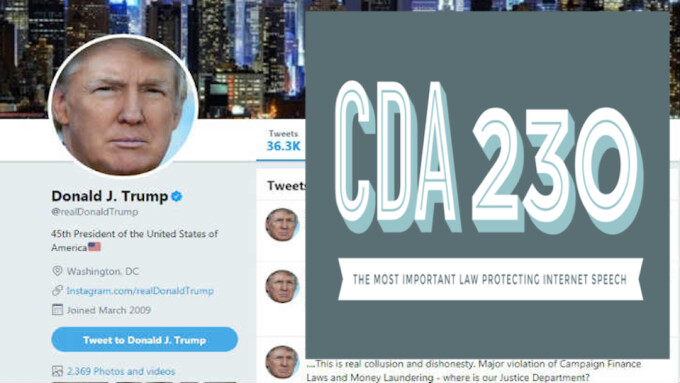[Update, 5:00 p.m.: President Trump signed the Executive Order this afternoon. For the full text of the final version, click here.]
WASHINGTON — A draft of the executive order announced yesterday by Donald Trump via Twitter in response to the platform’s attempt to fact-check his tweets proposes a radical modification of Section 230, the so-called “First Amendment of the Internet.”
Section 230 has ensured the legal protection of platforms from liability for third-party content since the popularization of the internet in the mid-1990s. It is also seen by legal experts as the key protection for online Free Speech, including all legal, consensual sexually-oriented content.
News wire service Reuters, which has seen today’s White House draft, described the executive order as “an extraordinary attempt to intervene in the media that experts said was unlikely to survive legal scrutiny.”
“The draft order seen by Reuters directs federal agencies to modify the way a law known as Section 230, which protects internet companies from liability for content posted by their users, is implemented,” the wire service reported.
The executive order draft, as written, also “attempts to circumvent Congress and the courts in directing changes to long-established interpretations of Section 230.”
The executive order "also orders a review of alleged 'unfair or deceptive practices' by Facebook and Twitter and calls on the government to reconsider advertising on services judged to 'violate free speech principles.'"
The executive order draft calls for the Federal Communications Commission (FCC) to propose regulations for Section 230 of the 1996 Communications Decency Act. It asks the FCC to "examine whether actions related to the editing of content by social media companies should potentially lead to the firms forfeiting their protections under Section 230."
FOSTA/SESTA legislation, currently challenged in court, was an early attempt to curtail Section 230 protections. War On Porn activists also have been clamoring for a revision of Section 230 in their attempts at erasing porn from the internet and shutting down major tube sites.
White House officials said yesterday that Trump would sign the order today, confirming several presidential tweets targeting "Big Tech" earlier in the day.
Industry Legal Experts Weigh In
XBIZ spoke with attorney Lawrence Walters, a First Amendment expert with extensive adult industry experience.
"Section 230 has been critical for online innovation and free expression," Walters told XBIZ. "The draft Executive Order appears to be a shot across the bow of the tech companies, warning them against unfair manipulation of the marketplace of ideas occurring in social media. There are significant First Amendment concerns with any governmental effort to regulate online speech."
Walters added that it is unclear whether the FCC or the FTC will take the recommended actions, "since they operate independently of Trump’s cabinet."
"Any order impacting Section 230 immunity will likely be challenged in court," Walters said. "Ultimately, Congress is the only body that can alter the broad protections granted by Section 230 but we are seeing some legislative activity in that realm as well — particularly the EARN IT Act. All of this has the potential to significantly impact our ability to publish and consume information on the internet can should be watched carefully."
Industry attorney Corey Silverstein told XBIZ he was "appalled" by this development.
"If somehow, some way, I was able to get the President’s attention for even 60 seconds," Silverstein added, "I would urge the President to reflect before moving forward with this executive order. The President is frustrated with the media and social media outlets, I get that — but the Presidency of the United States is not about utilizing the power of the Office of the President for self-serving purposes."
Without Section 230, Silverstein added, today’s internet "would not exist in terms of the free flow of information. Section 230 is being attacked at every corner and this is an absolute attack on the freedom of speech, as far as I’m concerned. Perhaps the President should consider that much of his success in the business world, and that he is sitting as the 45th President of the United States, is most certainly attributed to the internet and the free flow of information that he now apparently seeks to destroy."
"I would ask President Trump to please take a second to remember the importance of the First Amendment and realize that this sort of executive order defecates all over the very fabric of what the United States proudly stands for," Silverstein told XBIZ.






